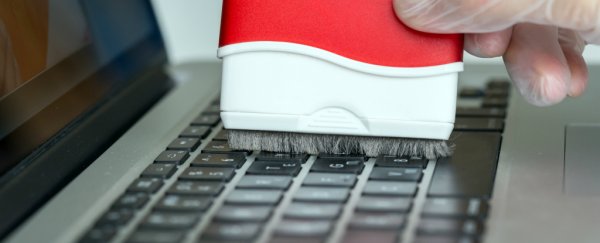Your computer keyboard is probably dirtier than a toilet seat.
In fact, an Australian study found that the typical desk has 400 times the amount of bacteria found on a toilet seat.
Toilet seats actually harbour around 50 bacteria per square inch, making that a relatively un-germy zone. Not so with the computer, especially those shared by multiple people.
One Chicago hospital found that its computer keyboards held drug-resistant strains of Staphylococcus like MRSA for up to 24 hours.
Another hospital in the Netherlands studied 100 of its keyboards and found that 95 tested positive for Streptococcus, Staphylococcus, and other pathogens, making them the dirtiest surfaces in the intensive care unit.
Considering how frequently we use computers, it's understandable that dirt constantly gets lodged in between the keys. We've all rushed to type something quickly after being out and about, eaten meals at our computers, and typed while simultaneously dealing with sticky substances.
Those of us who use computers at work talk, sneeze, and cough on the keys all day long, too.
When to clean your keyboard
Most microbiologists agree that everyone should wipe down their desk and keyboard at least once a week.
Doctors and nurses at the National Center for Health Research (NCHR) suggest that hospital keyboards should be disinfected much more often, though: at least once per day. The NCHR also suggests washing hands before and after using any shared computers, especially during flu season.
If you're the only one using your computer (and you're not touching many people throughout the day), most of the bacteria on your keyboard comes from your own hands and fingertips, so it probably isn't doing you any harm.
Still, wash your hands frequently to keep your desk space clean for longer.
How to clean your keyboard
Cleaning and disinfecting your keyboard is a simple process, and it works.
First, shut the computer down and unplug it before you start disinfecting. Then get rid of any crumbs or grit stuck on the keyboard with a can of compressed air before giving the keys a wipe.
Cleaning expert Melissa Maker recommends using a solution of equal parts water and rubbing alcohol, and applying it using a microfiber cloth.You can also use a q-tip dipped in alcohol to get between the keys.
While you're at it, consider giving your phone a cleansing swipe, too. Smartphones can easily pick up E. coli and Streptococcus bugs because we handle them so frequently and take them everywhere with us.
Philip Tierno, a microbiologist and pathologist at the New York University School of Medicine suggests giving your phone a good wipe down at the end of each day.
This article was originally published by Business Insider.
More from Business Insider:
